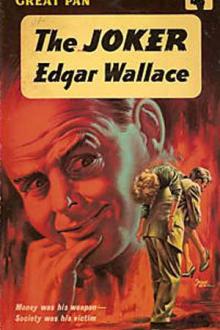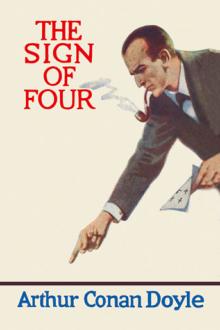The Joker - Edgar Wallace (good book club books TXT) 📗

- Author: Edgar Wallace
- Performer: -
Book online «The Joker - Edgar Wallace (good book club books TXT) 📗». Author Edgar Wallace
Elk, who had certain views on the Weather Bureau, expressed them at
length. But he had also something encouraging to say.
‘Fog is no more use to a burglar than a bandaged eye. Rain that keeps
policemen in doorways and stops amacher snoopin’ is weather from heaven
for the burglar.’
Rain was falling in sheets on the Thames Embankment when the police car,
which Jim Carlton drove, came through the arched gateway, and at the
corner of Birdcage Walk he met a wind that almost overturned the car. He
was blown across to Hyde Park Corner.
No. 704, Park Lane was one of the few houses in that thoroughfare which
was not only detached from other houses but was surrounded by a wall. It
could boast that beyond the library annexe was a small garden, in which a
cherry tree flourished. A police sergeant detailed for the service
appeared out of the murk and took charge of the car. In two minutes they
were over the wall, dragging after them the hook ladders which had been
borrowed during the afternoon from fire headquarters.
The domed skylight of the library was in darkness, and they gained its
roof with little trouble. Here Jim left Elk as an advanced post. He had
no illusions as to the difficulty of his task. All the upper windows were
barred or secured by shutters; but he had managed to secure an aerial
photograph which showed a little brick building on the roof, which was
probably a stair cover and held a door that gave entrance to the floors
below.
Jim drew himself up to the level of the first window, the bars of which
made climbing a comparatively easy matter, and, detaching the hook of the
ladder, he reached up and gripped the bars of the window above.
Fortunately he was on the lee side of Greenhart House and the wind that
shrieked about its corners did not greatly hamper him.
In ten minutes he was on the flat roof of the house, walking with
difficulty in his felt-soled shoes towards the square brick shed. Now he
caught the full force of the gale and was glad of the shelter which the
parapet afforded.
As he had expected, in the brick superstructure there was a stout door,
fastened by a patent lock. Probably it was bolted as well. He listened,
but could hear nothing above the howl of the wind, and then continued his
search of the roof, keeping the rays of his torch within a few inches of
the ground. There was nothing to be discovered here, and he turned to the
stairway. From his pocket he took a leather case of tools, fitted a small
auger into a bit, and pushed it in the thickness of the door. He had not
gone far before the point of the bit ground against something hard. The
door was steel-lined. Replacing the tool, he pulled himself up to the
roof of the shed, and he had to grip the edge to prevent being blown off.
The roof was of solid concrete, and it would need a sledge-hammer and
unlimited time to break through.
Possibly there was an unguarded window, though he did not remember having
seen any. He leaned across the parapet and looked down into the side
street that connected Park Lane with the thoroughfare where he had left
his car. As he did so, he saw a man walk briskly up to the door, open it
and enter. The sound of the slamming door came up to him. It was
obviously Harlow; no other man had that peculiar swing of shoulders in
his walk. What had he been doing out on such a night? Then it occurred to
Jim that he had come from the direction of his garage.
He heard a clock strike eleven. What should he do? It seemed that there
was no other course but to return to the waiting Elk and confess his
failure; and he had decided to take this action when he heard above the
wind the snap of a lock being turned; and then the voice of Harlow. The
man was coming up to the roof, and Jim crouched down in the shadow of the
shed.
‘… yes, it is raining, of course it is raining, my dear man. It is
always raining in London. But I have been out in it and you haven’t!
Gosh, how it rained!’
Though the words themselves had a querulous tone, Mr Harlow’s voice was
good-humoured; it was as though he were speaking to a child.
‘Have you got your scarf? That’s right. And button your overcoat. You
have no gloves, either. What a lad you are!’
‘I really don’t want gloves,’ said another voice. ‘I am not a bit cold.
And, Harlow, may I ask you again… ‘
The voice became indistinct. They were walking away from the listener,
and he guessed they were promenading by the side of the parapet. Unless
Harlow carried a light he would not see the ladder. Jim went stealthily
to the back of the shed and peered round the corner. Presently he
discerned the figures of the two men: they were walking slowly towards
him, their heads bent against the wind.
Quickly he drew back again.
‘… you can’t have it. You are reading top much and I won’t have your
mind overtaxed by writing too much! Be reasonable, my dear Marling… ‘
Marling! Jim held his breath. They were so near to him now that by taking
a step and stretching out his hand he could have touched the nearest man.
The lights in the street below gave him a sky-line against the parapet,
and he saw that Harlow’s companion was almost as tall as himself, save
for a stoop. He caught a glimpse of a beard blown all ways by the
gale… The voices came to him again as they returned; and then a sudden
scraping sound and an exclamation from the financier.
‘What the devil was that?’
From far below came a faint crash. Jim’s heart sank.
Harlow must have brushed against the hook ladder and knocked it from the
parapet.
‘You pushed something over,’ said the stranger’s voice.
‘Felt like a hook,’ said Harlow, and Jim could imagine him peering down
over the parapet. ‘What was it?’ he said again.
This was Jim Carlton’s opportunity. He could steal round the side of the
building, slip through the door which he guessed was open, and make his
escape. Noiselessly he crept along, and then saw a band of light coming
from the open doorway. Against such a light he must be inevitably
detected unless he chose a moment when their backs were turned.
But they showed no inclination to move, and stood there for a time
discussing the thing which Harlow had knocked from the stone coping.
‘It’s very curious’—the big man was talking—‘I don’t remember there was
anything when we came here this morning. Let us go down again.’
The opportunity was lost. Even as Jim stood there listening he heard the
feet of the men descending the stairs, the crash of the door as it was
closed. He was left on the roof without any means of making his way to
solid earth.
To communicate with Elk was impossible without inviting discovery. He
took a notebook from his pocket, wrote a hurried message and, tearing
out the sheet, wrapped in it a copper coin. He dropped it as near as he
could guess in the vicinity of the place where Elk would be, for he heard
the tinkle of the copper as it struck the ground. A quarter of an hour he
waited, but there was no sign from below. He tried the door again,
without even hoping that it would afford him an exit. To his amazement,
when he turned the handle the door opened. Had Harlow, in his hurried
departure, forgotten to lock it? That was not like Harlow.
Jim pushed the door farther open and looked down. A dim light was burning
in the room below, and he had a glimpse of a corner of the secretaire and
a stretch of red carpet. Noiselessly he descended the stout stairs, which
did not creak under his weight, and after a while, coming to the bottom,
he peered round the lintel.
The room was apparently empty. A big desk stood near the curtained
window; there was an empty lacquer bed in one corner, and, before him, a
door which was ajar. The only light in the apartment came from the
reading lamp on the desk—he crossed the room and, pressing the lamp
switch, put the room in darkness.
A light on the landing outside was now visible round the edge of the
door. He peeped out and could see no sign of life. Before him was a
stairway which led down to the lower floors of the house. Something told
him that his presence in the house was known. On the left of the landing
was another door, and the first thing he noticed was that the key was in
the lock. Whoever had opened and entered that loom had gone in such haste
that the key had not been removed. Jim saw his opportunity and in a
flash, he leant over, gripped the key and snapped the lock tight. As he
did so he heard a smothered exclamation from the room and grinned as he
tiptoed down the stairs.
The lower landing was in darkness, and he could guide himself by his
torch, testing every step he took, until he came into the dimly lighted
vestibule, which, only a few days before, had been crowded with men and
women, whose names were household words. He could heat nothing, and,
walking swiftly to the door, grasped the handle. In another second he was
flung back as though he had been struck by some huge invisible force.
He lay on the ground, breathless, paralysed with the shock. Then he heard
the opening of a door upstairs, and somebody whispering. To touch that
door handle, heavily charged with electric current, might mean death. The
power which made the door a death trap for any burglar who succeeded in
entering Harlow’s house, must come off an existing connection, he
thought. He saw the two white buttons jutting out of the wall, though
only one light was visible in the hall. He pressed the top button back,
but the hall light was not extinguished. This must be the connection.
He tried the door handle again, touching it gingerly with his finger-tip.
The current was off. In the briefest time he was in the street; and he
advertised his escape by closing the door with a crash that shook the
house.
Hurrying back to his car, he found Elk astride of the wall, in earnest
parley with the police sergeant.
‘I was just going round to the back to see what had happened to you,’
said Elk, vaulting on to the sidewalk.
‘Did you get my message?’
‘What was it? I heard something fall, and thought you must have dropped
the ladder. I couldn’t locate it anyway.’
It was long past midnight when the driver stepped on his brake before the
entrance to Scotland Yard. And the first man Jim saw as he walked into
the hall was Brown and his heart sank.
‘Anything wrong?’ he asked.
‘Miss Rivers has not returned to the house,’ said the detective. ‘I’ve
been on the phone to Stebbings. He tells me that she left at six o’clock
to deliver two letters, one to Ellenbury and the other to Harlow. I got
through to Ellenbury;





Comments (0)